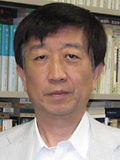
Japan Study Award
Kevin Doak(Professor at Georgetown University, Washington, D.C.)
A series of academic theses on Catholicism, Shintoism and nationalism, including the book titled “A History of Nationalism in Modern Japan: Placing the People”— Japanese translation: “Ogoe de Utae ‘Kimigayo’o” (PHP Institute, 2009)
Recipient’s remarks

I am deeply honored to be the recipient of the 2014 Terada Mari Japan Study Award. I would like to accept this award as a recognition that what I have tried to do in my research and writing has achieved some resonance among Japanese people—the greatest compliment a foreign scholar of Japanese studies can receive. For many years, I have been arguing, often against the grain of the mainstream of Japanese studies, that we all, Japanese and non-Japanese, need to have a more global understanding of modern Japanese culture and Japan’s place in the world. I have written about cosmopolitan values within Japanese nationalism, religious minorities (especially Catholic Japanese) who were patriotic citizens of both Imperial and postwar Japan, and the deep compatibilities of Shintoism and democratic Japan.
Often non-Japanese who are interested in Japanese culture reduce Japan to the opposite of what they deem as their own tradition. My own approach has been to explore those people and cultural forms within Japan that are at once both very Japanese and very global. Catholicism has struck me as an especially important part of this globalized Japan. There have been Catholic Japanese from the middle of the 16th century to the present. And while their numbers have not been large, their impact on traditional and modern Japanese culture and society has been enormous. I believe there are even more important lessons to learn from the experience of Catholic Japanese in the modern period, since they remind us of one way Japanese can be both completely global and at the same time deeply connected with their premodern traditional culture. And Catholic Japanese are linked to the world in unique ways, due to their connections with French missionaries and to Catholics in Korea, the Philippines, China and elsewhere. The Terada Mari Japan Study Award gives me the encouragement to continue my work, and I intend to focus in the future on one of the most important modern Catholic Japanese, the jurist Kotaro Tanaka who drew from his religious faith to outline a jurisprudence of “global law” that is as important today as it was in the 1930s when he first sketched out its principles.
I would like to thank the members of the Terada Mari Japan Study Award Jury for this award and the recognition it gives to my feeble efforts. I would also like to thank Ms. Yoshiko Sakurai for her encouragement and for her important voice in promoting a global, democratic Japan. And most of all, I cannot forget the countless Japanese people who, over nearly 40 years, have welcomed me into their homes, befriended me, and shown me in so many diverse ways the depth of kindness that makes the Japanese people stand out in the world.
Recipient’s biography
Born in 1960, Kevin Doak graduated from Quincy University in 1982 and obtained a Ph.D. in East Asian languages and civilizations from the University of Chicago in 1989. He also studied at Kyoto University, the University of Tokyo, Rikkyo University and Konan University in Japan. After serving in several positions, including as associate professor at the University of Illinois, he took up his current post in 2008. In 1994, he published “Dreams of Difference: The Japan Romantic School and the Crisis of Modernity” (University of California Press) with a Japanese translation titled “Nippon Roman-ha to nashonarizumu” (Kashiwa Shobo, 1999).
Japan Study Special Award
Liu Anwei(Chinese writer and professor at the Foreign Language Research and Teaching Center of Tokyo Institute of Technology)
A literary work titled “Shusakujin Den—Aru Chinichiha Bunjin no Seishinshi” (Zhou Zuoren—Intellectual History of a Litterateur Well-Versed in Japanese Culture) (Minerva Shobo, 2011)
Recipient’s remarks

I am very honored to have been chosen as the recipient of the Japan Study Special Award of the Japan Institute for National Fundamentals for my book “Zhou Zuoren—Intellectual History of a Litterateur Well-Versed in Japanese Culture.” I am sure this award for my book—which I feel is merely a humble academic publication—will provide a major inspiration for young people who are preparing to devote themselves to Japanese studies in the future.
I would like to continue doing as much as I can to help educate talented young people in both Japan and China. To that end, I am taking part in a joint post-graduate double-degree program of Tokyo Institute of Technology and Tsinghua University in Beijing for fostering young people who will become capable of enhancing interchange between Japan and China. I will keep in mind Tai Chi-tao’s (Dai Jitao) strident criticism in the early 20th century of Chinese people for lagging in Japanese studies, and keep myself from being swayed by the trends of the times.
I have lived in Japan for three decades. I dream of writing a book—based on my experiences in Japan—that could be comparable to Lafcadio Hearn’s (aka Koizumi Yakumo) last book “Japan: An Attempt at Interpretation.”
Recipient’s biography
Born in 1957, Liu Anwei specializes in comparative literature and comparative cultural history. After graduating from Beijing Foreign Studies University and taking an East Asian language literature course at Peking University’s graduate school, he came to Japan in 1982. The following year, he enrolled in the Comparative Literature and Intercultural Studies Program at the graduate school of the University of Tokyo, and was awarded a doctorate in 1989. After becoming an associate professor at Sapporo University, he began teaching at Tokyo Institute of Technology as an associate professor and later took up his current post. He is the author of several books, including “Toyojin no Hiai—Shusakujin to Nihon” (Sorrow of the Oriental Zhou Zuoren) (Kawade Shobo Shinsha, 1991) ; and “Koizumi Yakumo to Kindai Chugoku” (Lafcadio Hearn and Modern China) (Iwanami Shoten, 2004)
Japan Study Encouragement Award
Brandon Palmer(Associate professor of history at Carolina Coastal University, South Carolina)
Co-authored a book titled “Japan in Korea: Japan’s Fair and Moderate Colonial Policy (1910-1945) and Its Legacy on South Korea’s Developmental Miracle”— Japanese translation: “Nippon no Chosen Tochi o Kenshosuru 1910-1945” (Soshisha, 2013).
His book “Fighting for the Enemy—Koreans in Japan’s War, 1937-1945” (University of Washington Press, 2013). No Japanese translation yet.
Recipient’s remarks

I was greatly humbled when I heard that I had won the Japan Study Encouragement Award. This award will help advance my book, “Japan’s Fair and Moderate Colonial Policy (1910-1945) and Its Legacy on South Korea’s Developmental Miracle,” which at its core seeks a rectification of how historians write about Japan’s colonial endeavor in Korea.
Recipient’s biography
Born in 1970, Brandon Palmer graduated with a master’s degree from Brigham Young University and a doctorate from the University of Hawaii. His research interests center on the Japanese colonization of Korea, particularly the wartime mobilization of Koreans.
Japan Study Encouragement Award
Vassili Molodiakov(Russian professor at the Institute of Japanese Identity, Takushoku University in Tokyo)
A book titled “Japonizumu no Roshia—Sirarezaru Nichiro Bunka Kankeishi” (Japonism in Russia—Unknown History of Russo-Japanese Cultural Relations) (Fujiwara Shoten, 2011)
Recipient’s remarks

My book that has been selected for this award mainly explores Russo-Japanese friendship, mutual understanding and cultural exchanges. Japonism in the Russian Empire was the theme of my doctoral dissertation at Moscow State University. I would like to study the history of Russo-Japanese relations further so that I can help promote cultural exchanges between the two countries.
Recipient’s biography
Born in 1968, Vassili Molodiakov graduated from the Institute of Afro-Asian Studies at Moscow State University in 1993 after majoring in Japanese language and history. He carried out post-graduate studies at Moscow State University and the University of Tokyo, majoring in history and international relations. He obtained a Ph.D. in history from Moscow State University in 1996, a Ph.D. in advanced social and international studies from the University of Tokyo in 2002 and an LL.D. in political science from Moscow State University in 2004. Currently a professor at the Institute of Japanese Identity at Takushoku University, he also is a senior fellow at the Institute of Oriental Studies of the Russian Academy of Sciences.

